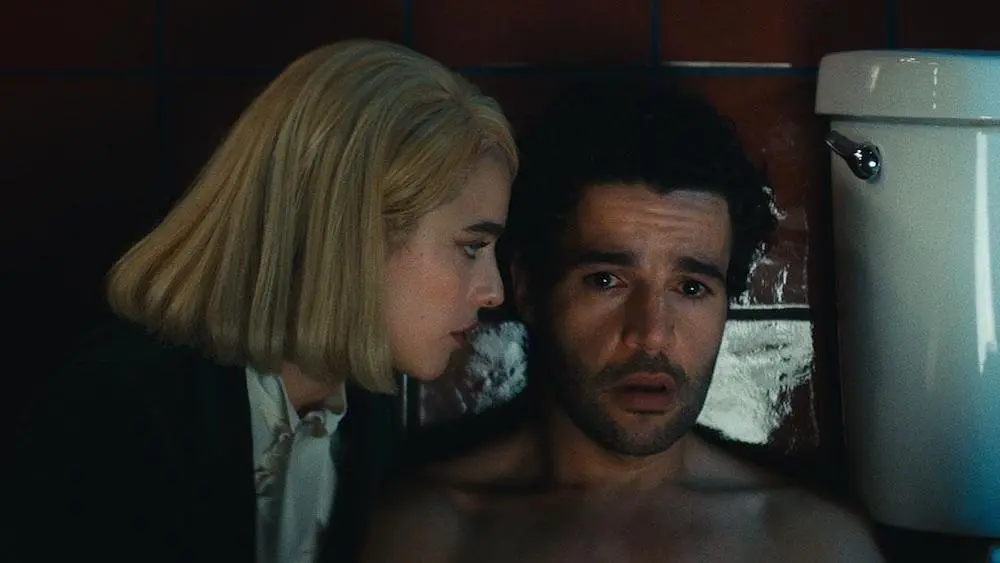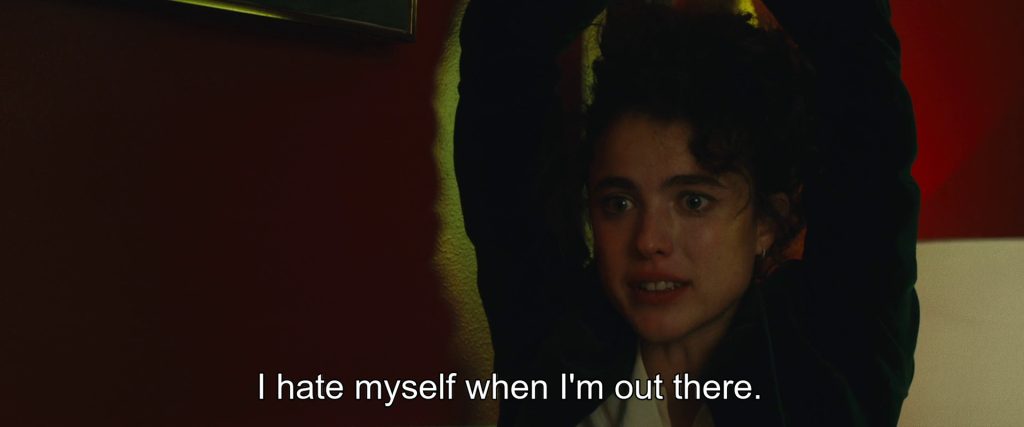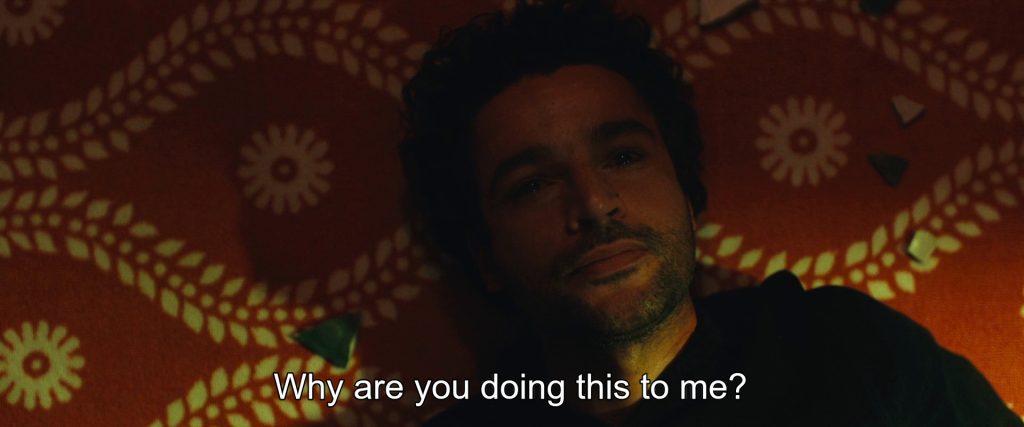
Sanctuary is a 2022 drama film directed by Zachary Wigon and written by Micah Bloomberg. IMDB Amazon
This essay contains spoilers.
Sanctuary resembles David Ives’ stage play Venus in Fur (film adaptation by Roman Polanski): it focuses on two people in a single location, and deals with the constantly shifting power relations between a man and a woman.
Hal (Christopher Abbot) is the heir of a hotel empire. He’s about to be appointed the CEO after the death of his father. In the luxury suite of one of the hotels, he meets with Rebecca (Margaret Qualley), who at first appears to be a lawyer who will interview him for the position. This escalates into a humiliation scene of Rebecca watching while Hal cleans the toilet in his underwear.
Rebecca takes off her blonde wig, and reveals herself as a pro-domme, specializing in no-contact psychological humiliation. While they enjoy a post-scene dinner, Hal says this is his last session with her, as he will be taking the position of CEO of his late father’s corporation. He thanks her for their sessions, which he scripted, and says that because of their work together, he is ready to accept the role.
Hal gives Rebecca a parting gift of a expensive watch. Rebecca leaves, but changes her mind, marches back into the suite, and demands more. She argues that all the wealth and power he will achieve is because of his work and therefore she deserves part of it, literally millions of dollars.
We’ve discussed the tropes of BDSM-as-therapy and dominatrix-as-therapist before. I consider them to be a common misunderstanding of outsiders who want to impose a teleology on BDSM practice. Rebecca and Hal have both bought into this concept, but when Rebecca asserts her claims, Hal, in effect, dismisses her as “therapist”, merely a worker, not a manager.
Sanctuary takes the power struggle in the pro-dominatrix/client relationship as its primary subject. Hal has the power of money on his side; their scenes take place in a suite at a hotel his late father owned, and he gives her a watch costing five figures as a parting gift, basically softening the blow of firing her. He even wrote the scripts the dominatrix is supposed to follow.
Rebecca counters this by asserting her own power and agency, by departing from Hal’s script. She recites the Pledge of Allegiance while seductively performing, to demonstrate that his script matters little compared to her physical presence. She made Hal into a man, and she can break him just as easily, or so she claims.
Their power struggle plays out through bluff and counter-bluff, blackmail, threats, and emotional manipulation. Did Rebecca really plant a camera in the room to record their sessions? Does Hal really not care if his kinks are revealed to the world? Would Hal go through with his threat to ruin her life? When the conflict escalates into the physical, and it looks like Rebecca has miscalculated how far she can push Hal, and he might actually hurt her.
Rebecca made the first “mistake” in this situation, long before Hal dismissed her. She says she has become so obsessed with dominating Hal in that room that she quit her (unspecified) job, broke off her engagement with her fiancee, and stopped seeing other domination clients. It is only when she is with him that she feels powerful and capable.

Once again, we have a professional female dominant, and money is a major factor in their relationship, so much so that is almost a third party in the relationship between Hal and Rebecca. Hal is about to inherit a position of great wealth and authority, one that he may not be suited to and may not even want. Rebecca (we are told) is a woman of great charisma and intelligence but is unable to apply that in regular employment. She hates her regular job, and she makes her entire livelihood and future dependent on her relationship with Hal.
Remove money from the equation and we’d have a completely different story. Would Ana Steele be as attracted to Christian Grey if he wasn’t a billionaire, or would she decide his controlling ways weren’t worth it? Would Rebecca be as fixated on dominating Hal if he wasn’t about to become fabulously wealthy? I can’t help thinking, ‘no’.
Rebecca might be good at psychologically dominating Hal, but that doesn’t mean she would be good at running a large corporation. I would argue she’s not even good at being a pro-domme, as she got emotionally over-involved with her client, and gave up all of her other clients.

Sanctuary is more of a fairy-tale than a realistic examination of sexuality and class dynamics. At the end, Hal modifies Rebecca’s suggestion that he use his inherited money to take control of the company by saying he will do that and then make her the CEO, a position she wants and he doesn’t. He would stay home and take care of her. Rebecca calls this being her “slave” and he doesn’t disagree, then says they’re in love and should get married. Like in Pretty Woman, marriage to a rich man is the solution to all of Rebecca’s problems. It’s a back-handed refutation of post-feminism, implying that a woman is has a better chance of achieving high status by a relationship with a high-status man, rather than on her own merits.
It’s strange that, out of all the cinematic examinations of female dominance I’ve seen, it’s Bound that shows that female dominance can lead to personal, professional and sexual success. Sanctuary tries to show that Rebecca’s dominance would work as well in the boardroom as it does in the hotel suite, but it avoids the question of why Rebecca isn’t in the boardroom in the first place.




[…] heb ik de film (nog) niet gezien dus ik kan er weinig over zeggen. History of Bdsm heeft er een mooi blog over geschreven, deze bevat echter wel […]
[…] History of BDSM, Sanctuary (2022): The Celluloid Dungeon […]
[…] History of BDSM, Sanctuary (2022): The Celluloid Dungeon […]
[…] of BDSM, Sanctuary (2022): The Celluloid Dungeon. Kinky movies just aren’t the same nowadays, and unfortunately, it sounds like this is one to […]
[…] History of BDSM, Sanctuary (2022): The Celluloid Dungeon […]
[…] of BDSM, Sanctuary (2022): The Celluloid Dungeon This entry was posted in Uncategorized by jaime. Bookmark the […]
[…] For anyone interested in kink this review is a helpful guide to an essential read. History of BDSM, Sanctuary (2022): The Celluloid Dungeon […]
[…] History of BDSM, Sanctuary (2022): The Celluloid Dungeon […]